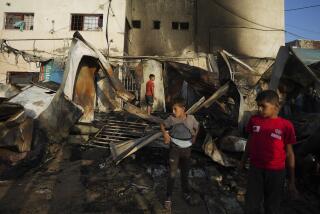Civilian Blood Bank Shipments Ordered : Military: Pentagon activates post-WWII program for first time to supply forces in Mideast.
- Share via
WASHINGTON — The Pentagon, intensifying its preparations for possible combat in the Persian Gulf after Jan. 15, has ordered civilian blood banks to begin supplying blood for shipment to Saudi Arabia.
The Pentagon this week activated the Armed Services Blood Program for the first time since it was established shortly after World War II.
Military officials notified the American Red Cross and the American Assn. of Blood Banks that each would be required to provide 375 units of whole blood a week beginning next Monday. The blood is to be delivered to McGuire Air Force Base in New Jersey for transfer to military aircraft bound for the Persian Gulf.
If war breaks out, each of the two blood banks would be called upon to deliver a minimum of 800 units a day, defense officials said. A unit is about a pint of blood.
The initial order for 375 pints a week is merely a test of the system and will have no noticeable effect on blood supplies available to American civilian hospitals and clinics, said Elizabeth Hall, an official at American Red Cross headquarters in Washington.
“We collect 20,000 (units) a day,” she said. “We do not expect to have to ask additional donors to come in.”
However, the civilian supply of whole blood would be strained if war broke out, and the gulf deployment has already caused a serious shortage of gamma globulin, the blood product used to inoculate against and treat hepatitis.
Officials at the Centers for Disease Control said last month that gamma globulin supplies were being taxed by the huge military deployment, and private doctors said that the price has shot up by 300%.
Meanwhile, chief Pentagon spokesman Pete Williams defended medical preparedness to treat casualties in the gulf region, which has been criticized for lagging far behind preparations for fighting.
Officials have said that less than half the 10,000 hospital beds that military planners believe are needed in the theater have arrived and that the Desert Shield operation is suffering comparable shortages of medical personnel and supplies.
Williams, while not divulging numbers of hospital beds or other medical assets, acknowledged that medical supplies in the region are adequate only for the original deployment of 240,000 troops. He said additional personnel and equipment are now being rounded up in the United States and Europe for shipment to the theater.
Military officials decided to activate the emergency blood supply system shortly after the plans were laid to send an additional 200,000 troops to reinforce the 260,000 now in the region. The new supplies will augment existing military blood inventories, which are collected primarily from GIs and their families, an official said.
“We’re looking at a buildup of forces over there and more troops flowing into the theater, and saw this as a step that was necessary,” said Pentagon spokeswoman Susan Hansen. “Planning had to be done to ensure an adequate supply of this very necessary commodity to our forces.”
The Pentagon will pay an average of $90 for each unit of blood, roughly the prevailing market rate.
Blood is being stockpiled to meet the normal day-to-day medical needs of the thousands of U.S. troops in the region, as well as to build a supply for the first days of combat.
Outside analysts have estimated that U.S. casualties could exceed 1,000 a day in the early stages of a high-intensity war with Iraq.
Red Cross officials expect that if war broke out, the Pentagon would immediately call for the organization to provide the 800-unit-a-day minimum, which would strain domestic supplies.
“We could meet that for two days,” Hall said. “After that, we’d have to put out a special appeal to donors. But we’re sure that the patriotic response from this country, if there is any need for blood in the gulf, is going to be tremendous.”
More to Read
Sign up for Essential California
The most important California stories and recommendations in your inbox every morning.
You may occasionally receive promotional content from the Los Angeles Times.













